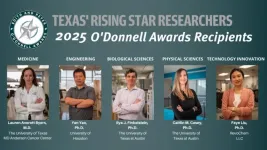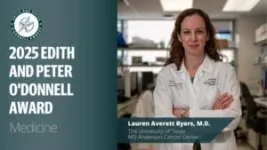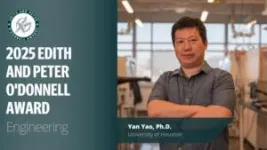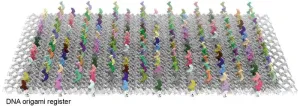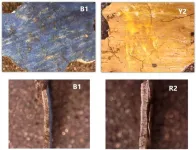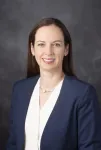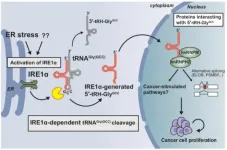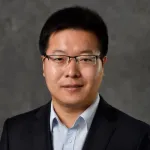These are the breakthroughs by Texas’ rising stars in research being honored with the 2025 Edith and Peter O’Donnell Awards by TAMEST (Texas Academy of Medicine, Engineering, Science & Technology):
• Medicine: Lauren Averett Byers, M.D., The University of Texas MD Anderson Cancer Center
• Engineering: Yan Yao, Ph.D., University of Houston
• Biological Sciences: Ilya J. Finkelstein, Ph.D., The University of Texas at Austin
• Physical Sciences: Caitlin M. Casey, Ph.D., The University of Texas at Austin
• Technology Innovation: Faye Liu, Ph.D., RevoChem LLC
“The Edith and Peter O’Donnell Awards are a huge award in our state, and it is extremely competitive due to the fact that Texas has many talented scientists deserving of this award,” said Edith and Peter O’Donnell Awards Committee Chair Margaret “Peggy” A. Goodell, Ph.D. (NAM), Baylor College of Medicine, who herself received the O’Donnell Award in Medicine in 2011. “I’ve seen firsthand how impactful these awards can be to a young researcher in our state, and it is an honor to help carry the tradition to the next generation. These five researchers are truly among the best and brightest in Texas, and we can’t wait to see where their careers take them from here.”
Over $1.5 million has been awarded to more than 75 recipients in the categories of Medicine, Engineering, Biological Sciences, Physical Sciences and Technology Innovation since the inception of the O'Donnell Awards in 2006. Sixteen O’Donnell Awards recipients have gone on to be elected to the National Academies, including five who have been elected to more than one National Academy.
The recipients will be honored at the 2025 Edith and Peter O’Donnell Awards Ceremony and give presentations on their research at the TAMEST 2025 Annual Conference: Transformational Breakthroughs, at the Westin Las Colinas in Irving, Texas.
All are welcome to register to attend the ceremony and the TAMEST Conference.
Learn more about the 2025 O’Donnell Awards recipients:
Medicine: Lauren Averett Byers, M.D., The University of Texas MD Anderson Cancer Center
View a video on Dr. Byers' groundbreaking research here.
Internationally recognized physician-scientist Lauren Averett Byers, M.D., Professor and Thoracic Section Chief of Thoracic/Head and Neck Medical Oncology at MD Anderson, is the recipient of the 2025 Edith and Peter O’Donnell Award in Medicine from TAMEST. She was chosen for identifying novel therapeutic strategies and making fundamental discoveries related to small cell lung cancer (SCLC).
SCLC is one of the most aggressive types of cancer. It evolves quickly and can become resistant to treatment early on, making it difficult to manage. With the current standard of care, patients generally lived around one year with the disease. Previously, all SCLC cases were treated the same; however, Dr. Byers and her team noticed that patients were responding differently to various types of treatments.
Utilizing high-throughput molecular profiling, Dr. Byers and her team identified that there are four major types of SCLC as opposed to one. This game-changing discovery led to several advances in the field, including identifying new therapeutic targets and predictive biomarkers for each type. Her team began using a patient’s blood test to understand their cancer and utilized the biomarkers present in the SCLC over time to monitor and manage their treatments.
Since SCLC evolves quickly, her team looked at the drug targets in patients’ blood samples to understand how the cancers escape from treatment. Those discoveries can inform decisions about a patient’s next treatment or combination of treatments. Further, Dr. Byers’ team can utilize these blood samples to generate new models to study and grow SCLC in the laboratory and to pinpoint the new biomarkers to match a patient with a personalized, more effective therapy option. Her work is currently showing promising results in clinical trials, with the goals of confirming more effective treatments, better engaging the immune system and improving treatment outcomes.
“An exceptional physician-scientist, Dr. Byers is focused on both taking care of her patients and also on understanding the disease at a deeper level, which can lead to a variety of new advances,” said nominator James P. Allison, Ph.D. (Nobel Laureate, NAM, NAS), Regental Professor and Chair of Immunology, and Director of the James P. Allison Institute at MD Anderson. “By conducting quality science, she has made important discoveries and identified key vulnerabilities for small cell lung cancer that have the potential to significantly improve patient outcomes. I am proud to see Dr. Byers honored for her commitment to meaningful advances for patients with cancer.”
Engineering: Yan Yao, Ph.D., University of Houston
View a video on Dr. Yao's groundbreaking research here.
Forward-thinking materials scientist Yan Yao, Ph.D., Hugh Roy and Lillie Cranz Cullen Distinguished Professor of Electrical and Computer Engineering at the University of Houston, is the recipient of the 2025 Edith and Peter O’Donnell Award in Engineering from TAMEST. He was chosen for creating environmental and sustainable solutions for lithium-ion battery technology.
The world runs on lithium-ion batteries, but their dependence on scarce resources, like lithium, cobalt and nickel creates environmental challenges. These critical minerals require intensive mining and are not renewable. To combat this, Dr. Yao’s research focuses on discovering new materials and storage mechanisms for batteries based on abundant materials while creating energy storage solutions that reduce reliance on critical resources and have a positive environmental impact.
Dr. Yao and his team started by looking at materials available at scale and developing methods to design and synthesize new materials with tunable electrochemical responses and transport properties similar to those in lithium-ion batteries. By learning to control reactivity at interfaces, his team demonstrated sustainable batteries that outperform traditional battery technologies.
Building on advances in materials development and mechanistic understanding, his team developed aqueous batteries, which use water as an electrolyte, making them inexpensive, nonflammable and abundant. By utilizing materials such as sodium and magnesium, which can be extracted from seawater and are largely available in the United States, his team is creating renewable energy storage solutions that are cheaper, safer and less energy intensive to produce without worry of supply chain issues.
“As energy demands from electric vehicles and grid storage continues to escalate, the importance of producing more environmentally friendly batteries has never been greater,” said nominator Pradeep Sharma, Ph.D. (NAE), Dean of the Cullen College of Engineering and Hugh Roy and Lillie Cranz Cullen Distinguished University Professor, University of Houston. “Dr. Yao is tackling critical scientific challenges and is focused on developing technologies that power a sustainable, better future. His inventions, including aqueous organic batteries, magnesium batteries and solid-state sodium batteries, will undoubtedly have an enormous impact on environmental and energy sustainability.”
Biological Sciences: Ilya J. Finkelstein, Ph.D., The University of Texas at Austin
View a video on Dr. Finkelstein's groundbreaking research here.
Pioneering molecular biologist Ilya J. Finkelstein, Ph.D., Associate Professor at The University of Texas at Austin, is the recipient of the 2025 Edith and Peter O’Donnell Award in Biological Sciences from TAMEST. He was chosen for his work improving the safety and efficacy of gene editing and understanding the mechanisms of DNA repair to potentially cure diseases.
Imagine being able to cure diseases, such as cancer, by fixing mistakes in your own DNA. Dr. Finkelstein and his team are aiming to do exactly that by studying how our cells maintain their genetic information, and how we can edit it safely.
The human genome is made up of billions of letters of DNA. Every individual cell, as it divides, must make an exact copy of its DNA and package it into the nucleus. If something goes wrong, much like a hard drive in a computer, it can corrupt the whole system, and the cell can turn cancerous. While some genome damage is natural, and special caretaker proteins can fix them on their own, cancers and other diseases arise after the accumulation of too much DNA damage. Dr. Finkelstein is discovering how these caretaker proteins repair the genome, and how their dysregulation ultimately results in cancer. These studies can lead to future therapies that bolster our natural defenses against DNA damage.
Dr. Finkelstein and his team are also developing safe and effective ways to remove disease-causing errors by editing the genome. To do so, his laboratory has developed new approaches to study gene editing CRISPR enzymes and has discovered new types of gene editor proteins. These efforts have provided fundamental insights into how proteins interact with nucleic acids to shape our genomes. Ultimately, Dr. Finkelstein hopes to create safer and more effective gene therapies.
“Dr. Finkelstein is incredibly creative and able to pull things out of multiple disciplines to develop his work. There are thousands of people working on gene editing, but what sets Ilya apart is his ability to bring in approaches that nobody else has worked on,” said nominator Alan M. Lambowitz, Ph.D. (NAS), Professor of Molecular Biosciences and Oncology and Mr. and Mrs. A. Frank Smith, Jr. Regents Chair in Molecular Biology, The University of Texas at Austin. “It's his ability to think outside the box and his diligence to follow his ideas through to completion and overcome all problems along the way that truly makes him unique. What he is doing will revolutionize the future of genetic disease therapeutics.”
Physical Sciences: Caitlin M. Casey, Ph.D., The University of Texas at Austin
View a video on Dr. Casey's groundbreaking research here.
World-renowned observational astrophysicist Caitlin M. Casey, Ph.D., Associate Professor at The University of Texas at Austin, is the recipient of the 2025 Edith and Peter O’Donnell Award in Physical Sciences from TAMEST. She was chosen for discovering the most distant and massive galaxies that have reshaped our understanding of early Universe star formation and supermassive black holes.
The observable Universe is estimated to be about 13.8 billion years old, and Dr. Casey and her team are trying to find uniquely massive galaxies from its first billion years. These galaxies are on the most extreme margins of what the Universe can produce. To do so, Dr. Casey leads the COSMOS-Web Survey, made up of an international team of hundreds of scientists with the aim of constructing the largest image of the distant Universe that has ever been created. COSMOS-Web was James Webb Space Telescope’s (JWST) largest public survey in its first year and exceeds the scale of the Hubble Space Telescope’s Ultra Deep Field by 200 times.
By finding such extreme sources from the most powerful telescopes in the world, Dr. Casey can test the fundamental laws of physics in the primordial Universe. The goal is to see how the first galaxies, the first stars and even the first black holes formed 13 billion years ago compared to those formed today. The JWST’s unique capabilities allows Dr. Casey’s team to see objects 100 times fainter than previous telescopes could see in infrared light and reach much farther back in time. By searching for the brightest beacons at the longest wavelengths, her team can find some of the earliest galaxies that seemingly outshine all others.
Such exceptionally bright galaxies test the limits of our cosmological model for how the Universe formed and changed with time. These galaxies, seen just a few hundred million years after the Big Bang, had to assemble over a very short period of time to shine so brightly. Her findings are unexpected because it implies there was extremely efficient star formation that isn’t seen in the Universe today. These discoveries have allowed scientists to hone their understanding of the early Universe. Dr. Casey’s goal with the COSMOS-Web project is to dig deeper and not just discover exceptionally bright galaxies, but also map out where they live in the large-scale structure of the cosmos.
“Using the best technology and telescopes in the world, Dr. Casey peers as far back in time as is possible to understand the emergence and characteristics of some of the earliest galaxies in the Universe,” said nominator David A. Vanden Bout, Ph.D., Dean of the College of Natural Sciences at The University of Texas at Austin. “With her groundbreaking work, she is reshaping what we know about the Universe and inspiring discoveries at our cosmic frontiers. Not only is she a fantastic and talented scientist, she also models how great science requires a lot of intentional mentoring and support of a team.”
Technology Innovation: Faye Liu, Ph.D., RevoChem LLC
View a video on Dr. Liu's groundbreaking research here.
Visionary geochemist Faye Liu, Ph.D., Founder and Chief Executive Officer of RevoChem LLC, is the recipient of the 2025 Edith and Peter O’Donnell Award in Technology Innovation from TAMEST. She was chosen for pioneering geochemical fingerprinting technology to optimize energy production processes thousands of feet below the Earth’s surface.
Dr. Liu’s Houston-based company utilizes two-dimensional gas chromatography, geochemistry and data analytics to improve efficiency and reduce cost and environmental impacts in the energy industry. Her process takes the chemical composition of a drop of oil and creates a digital fingerprint, which maps out where crude oil is produced from the subsurface and how it evolves through time.
Dr. Liu’s technologies increase the resolution from about 100 compounds to over 2,000 compounds in the same drop of oil. This enables Dr. Liu’s team to profile the thousands of compounds that are naturally occurring in crude oil to be used as a tracer to identify where a drop of crude oil is produced from within approximately 10-to-15 feet thickness accuracy from the subsurface. Monitoring where the oil is coming from is critical for oil companies to understand how far apart and how many wells should be drilled in an area without the need for companies to drill additional monitoring wells or employ more expensive and invasive tools.
This model of utilizing chemical information has created an immense amount of value for the industry and enabled them to make data-driven decisions in a cost-effective and non-invasive way by extracting more oil while also reducing the need for unnecessary drilling. Proven first in the oil and gas industry, Dr. Liu hopes to take this process and infrastructure to a bigger realm. Fingerprinting chemical biomarkers in Volatile Organic Compounds (VOCs) could help trace and recreate flavors or aromas in the food industry, cosmetics and even aid in the early diagnosis of certain diseases.
“Dr. Liu is a true innovator and has used advanced chemical sciences to creatively address oil field issues and applications,” said nominator Oliver C. Mullins, Ph.D. (NAE), Retired Fellow, SLB. “Her methods have revolutionized characterization, development and production optimization and monitoring in unconventional reservoirs while minimizing environmental impacts. Her applications are very strong and I am excited for the great potential in many different arenas. It truly feels like we are watching the future unfold.”
About the O’Donnell Awards:
The Edith and Peter O’Donnell Awards annually recognize rising star Texas researchers who are addressing the essential role that science and technology play in society, and whose work meets the highest standards of exemplary professional performance, creativity and resourcefulness.
Thanks to a $1.15 million gift from the O’Donnell Foundation in 2022, the O’Donnell Awards have expanded to include an additional science award. The awards now recognize recipients in the categories of Medicine, Engineering, Biological Sciences, Physical Sciences and Technology Innovation. (Previously, the TAMEST O’Donnell Awards rotated its science award between physical and biological sciences every year.)
The Edith and Peter O’Donnell Awards are made possible by the O’Donnell Awards Endowment, established in 2005 through the generous support of several individuals and organizations. View a full list of supporters here.
About TAMEST (Texas Academy of Medicine, Engineering, Science and Technology):
TAMEST was co-founded in 2004 by the Honorable Kay Bailey Hutchison and Nobel Laureates Michael S. Brown, M.D., and Richard E. Smalley, Ph.D. With more than 345 members, 8 Nobel Laureates and 23 member institutions, TAMEST is composed of the Texas-based members of the three National Academies (National Academy of Medicine, National Academy of Engineering and National Academy of Sciences) and other honorific organizations. We bring together the state’s brightest minds in medicine, engineering, science and technology to foster collaboration, and to advance research, innovation and business in Texas.
TAMEST’s unique interdisciplinary model has become an effective recruitment tool for top research and development centers across Texas. Since our founding, more than 300 TAMEST members have been inducted into the National Academies or relocated to Texas.
###
END
